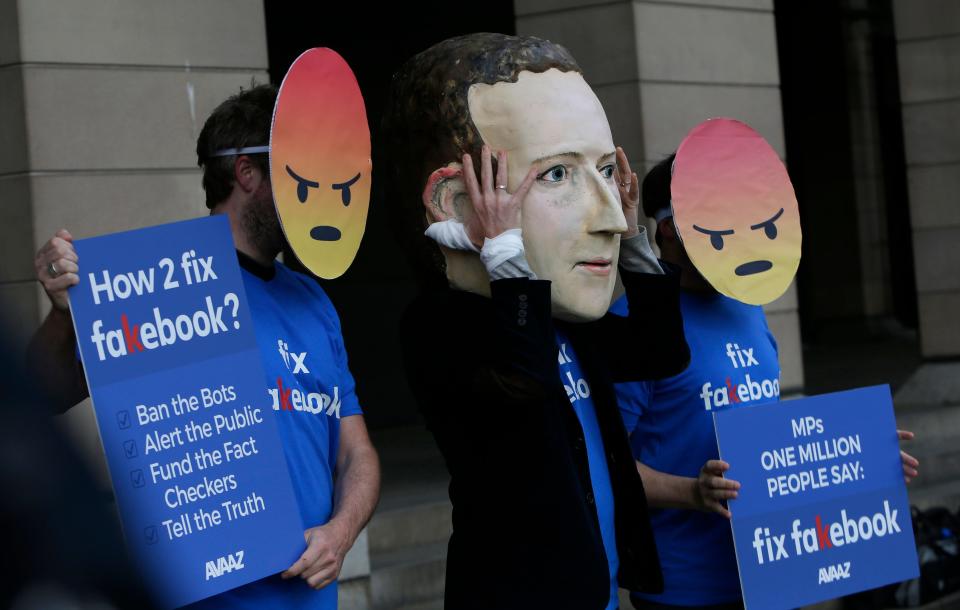Social media makes a killing selling conflict. Could cost be death of democracy? | Opinion
We are social media pawns on a chess board of greed and profit. “We the People” are more divided today because we have been lulled slowly into technological snares like echo chambers, algorithms and shocking, contentious headlines. Great democracy has been forged in the fires of great adversity. Our Founding Fathers harnessed strength in a human being’s capacity to share ideas, while finding compromise to promote the greater good for the whole. If we view those with different ideas as something other than human beings worthy of respect or thoughtful consideration, we march into dangerous territory. Democracy dies from hate of other citizens and discouragement of a plurality of ideas.
Technological advances have manipulated content online to increase divisiveness. We read in "The Dark Psychology of Social Media" that “Citizens are now more connected to one another, on platforms that have been designed to make outrage contagious.” A small number of social media companies have become the gatekeepers of content, deciding how it is organized and how often it will be seen.
Sergei Smirnov, director of Russia’s security agency, stated in 2012: “New technologies are being used by Western special services to create and maintain a level of continual tension in society with serious intentions extending even to regime change.” He urged Russia to develop similar technology. As citizens who cherish our freedoms, we should find such a statement alarming. It is imperative we properly recognize how power and greed create corruption while eliminating free choice.

'Indignant disagreement' leads to engagement
Social media organizations are intentional in eliciting a specific response from an audience. A 2017 study by the Pew Research Center found that posts exhibiting “indignant disagreement” received nearly twice as much engagement. In addition, Arthur C. Brooks stated, “Tech companies understand what causes dopamine surges in the brain, and they lace their products with ‘hijacking techniques’ that lure us in and create ‘compulsion loops.’ ”
Hear more Tennessee voices: Get the weekly opinion newsletter for insightful and thought-provoking columns.
Dopamine is a brain transmitter connected with how we process pleasure and is “hailed as the secret sauce that makes an app, game or social platform 'sticky,' the investor term for 'potentially profitable,' ” as Simon Parkin put it in an article in the Observer titled "Has dopamine got us hooked on Tech?" Social media outlets then strategically use algorithmic ordering of specific content, hoping to keep us engaged like gambling or drug addicts. In "America is Living James Madison’s Nightmare" in 2018 in the Atlantic, James Rosen states: “Inflammatory posts based on passion travel farther and faster than arguments based on reason. Rather than encouraging deliberation, mass media undermine it by creating bubbles and echo chambers in which citizens see only those opinions they already embrace.”

Your state. Your stories. Support more reporting like this.
A subscription gives you unlimited access to stories across Tennessee that make a difference in your life and the lives of those around you. Click here to become a subscriber.
Exposure to diversity of opinions is vital

How then do we protect our democracy in this new era of technology? A healthy democracy requires exposure to a diversity of opinions. Maintaining a diversity of ideas while recognizing an opportunity to increase unity is paramount. In "An Economic Theory of Political Action in a Democracy" in 1957, a wise Thomas S. Monson said, “Never let a problem to be solved become more important than a person to be loved.” I would like to suggest six ways we might increase unity within our country.
How to increase unity
1. Cultivate friendships with people who have different views than you.
2. Serve in an organization that supports immigrants.
3. Get involved in your local government.
4. Listen to opposing views with an open mind.
5. Read news from several different sources with different views.
6. Take a break from any contentious social media sources.
Let us demand accountability of social media. Governance where transparency, due process and the human rights of the people are paramount. I pray we find strength again in diversity and plurality of ideas. Unity and democracy are worth fighting for.
Elizabeth Rich lives in Brentwood. She is a mother of five and a graduate student in international affairs at Middle Tennessee State University.
This article originally appeared on Nashville Tennessean: Social media makes a killing selling conflict.

